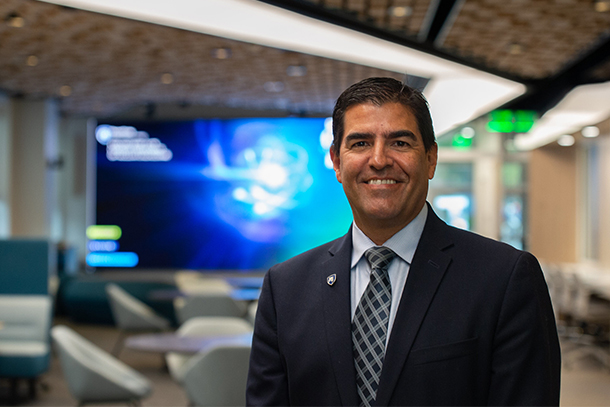
Jean Paul Allain, department head and Huck Chair Professor of Nuclear Engineering at Penn State, was named this year’s recipient of the Institutes of Electrical and Electronics Engineers Nuclear and Plasma Sciences Society’s Fusion Technology Award, presented by the Fusion Technology Committee. Image Credit: Kelby Hochreither/Penn State
Nuclear engineering department head receives Fusion Technology Award
April 14, 2023
By Sarah Small
UNIVERSITY PARK, Pa. — Jean Paul Allain, department head and Huck Chair Professor of Nuclear Engineering at Penn State, was named this year’s recipient of the Institutes of Electrical and Electronics Engineers (IEEE) Nuclear and Plasma Sciences Society (NPSS)’s Fusion Technology Award, presented by the Fusion Technology Committee. He will be presented with the award during the Symposium on Fusion Engineering, held July 9-13 in Oxford, England.
The award is given to “recognize outstanding contributions to research and development in the field of fusion technology,” according to the IEEE-NPSS website.
Fusion technology harnesses energy produced via fusion nuclear reactions, which require a plasma, the fourth state of matter, to enable subatomic particles to reconstitute themselves. Allain’s contributions to the field of fusion technology include discoveries related to the interactions of fusion plasma and low-energy ions with material surfaces as well as the role surface chemistry plays in plasma-material interactions.
“One of the most significant design challenges for materials performance exposed to extreme environments — for example, heat, pressure and radiation — is maintaining structural integrity while preventing or minimizing long-term damage,” Allain said. “In a fusion nuclear reactor, the expected operational environment is inherently extreme. The plasma-material interface is a critical region for design. Controlling the architecture in advanced materials to tailor properties beyond structure and composition has provided a new paradigm in modern materials design.”
Allain’s contributions to the science and technology of surface chemistry in fusion have culminated in more than 50 peer-reviewed articles on the subject — out of more than 160 total peer-reviewed articles authored by Allain. He has contributed to the engineering design and integration of plasma-material interface diagnostic systems in several fusion and high-intensity plasma systems.
“Materials and their interactions with intense plasmas has been recognized as one of the key challenges to achieve practical nuclear fusion energy,” said IEEE NPSS Fusion Technology Committee Chairperson Martin Nieto-Perez, who is also an associate teaching professor in the Penn State Ken and Mary Alice Lindquist Department of Nuclear Engineering. “Dr. Allain, during his prolific career, has made important contributions to both the development of materials and a better understanding of how they interact with the plasma edge in nuclear fusion devices. It is a very well-deserved award.”
Allain said he’s honored both to receive this award and to be able to contribute to the progress of the field at such a critical time.
“This decade is one of the most exciting times for nuclear fusion energy, with over $4 billion of private investment in nuclear fusion startups, the achievement of nuclear fusion ignition demonstrated at the National Ignition Facility at Lawrence Livermore National Laboratory and President Biden’s announcement of his Bold Decadal Vision in 2022 to support fusion technology development towards a fusion pilot plant in the 2030s,” Allain said. “Realizing carbon-free nuclear fusion energy remains one of the outstanding grand challenges of our time — a seemingly limitless energy source using deuterium extracted from seawater as fuel and producing little to no radioactive waste.”



